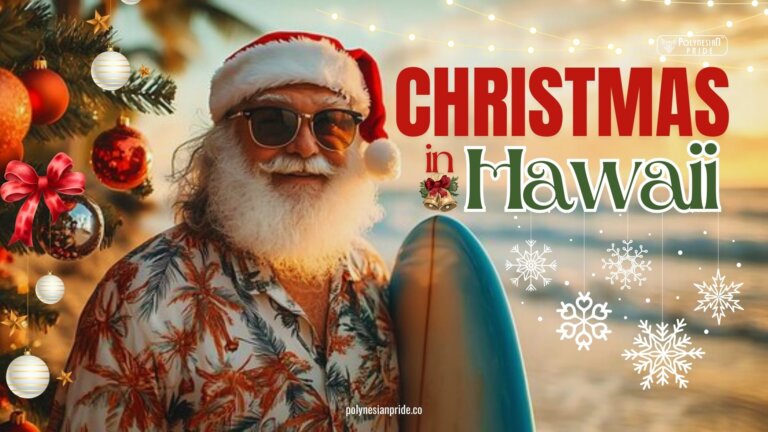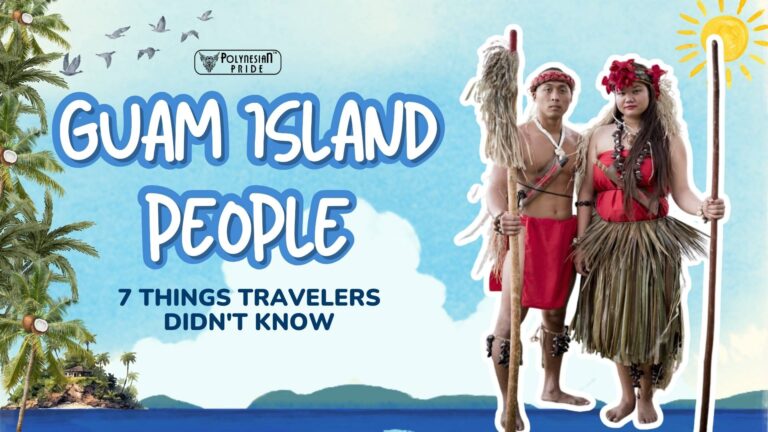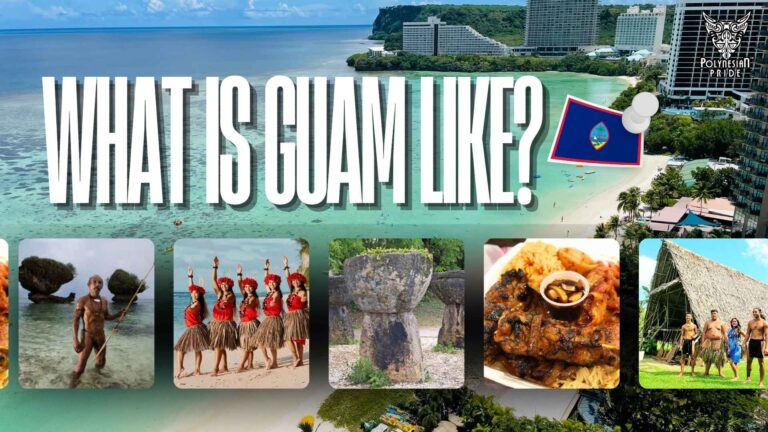15+ Fascinating Facts About Fiji People and Their Culture
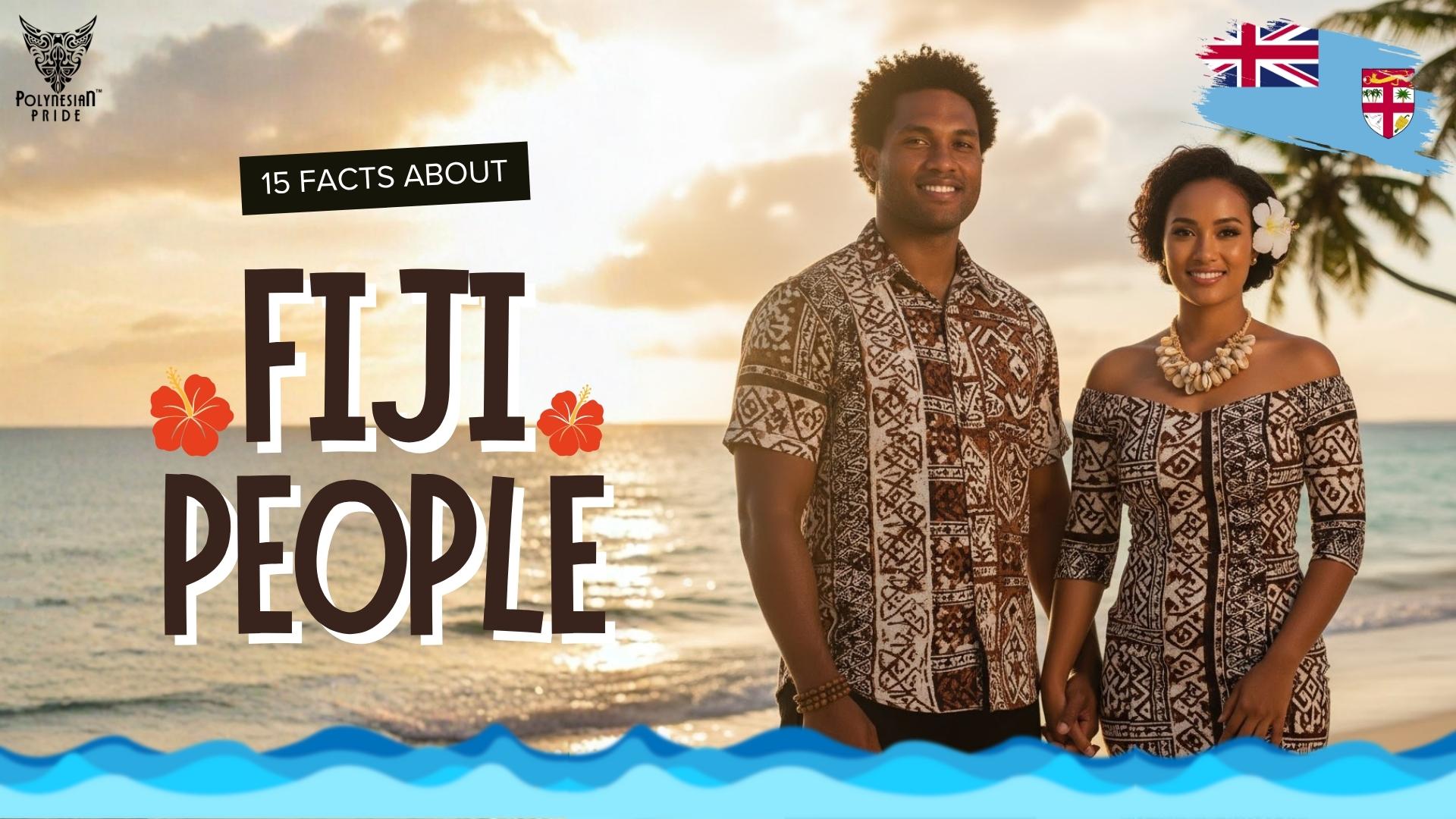
Bula!
Sure, Fiji’s beaches are stunning – but it’s the Fiji people who genuinely make the islands shine. Known for their big smiles, easy laughter, and that irresistible Bula Spirit, they turn every “hello” into a warm welcome.
From sharing stories over a cup of kava to dancing through life with joy, the people of Fiji make visitors feel like family. Let’s dive into 15 fascinating facts that show why the people of Fiji are the heart of this tropical paradise.
Fact 1: Fiji People Are a Blend of Melanesian and Polynesian Heritage
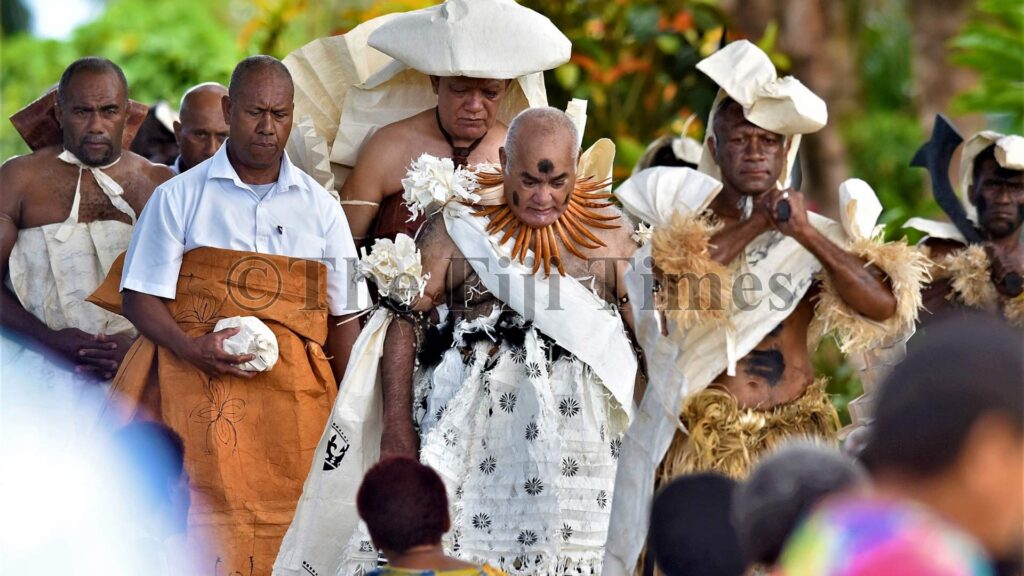
Long before resorts and postcards, ancient voyagers from Melanesia and Polynesia sailed across the Pacific and settled these islands. Their mix of cultures gave birth to the Fiji people we know today: strong, kind, and endlessly welcoming.
You can still see both roots in daily life: Polynesian rhythm in their music and dance, Melanesian artistry in their crafts, and community spirit. That blend is what makes the people of Fiji so beautifully unique.
Fact 2: Over Half of Fiji’s Population Is Indigenous iTaukei People
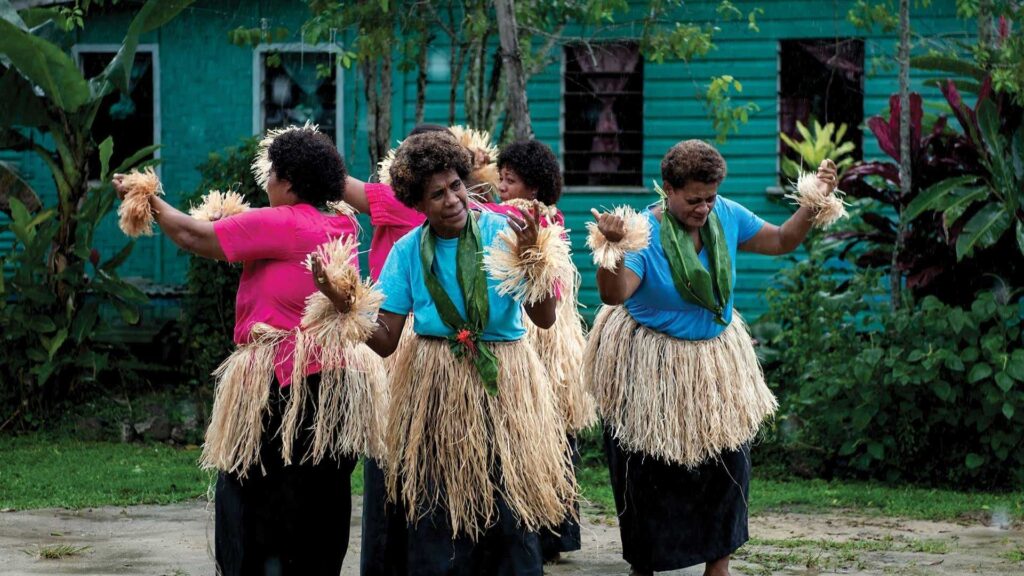
About 56% of Fiji’s population is Indigenous Fijians, known as iTaukei. Their lives are deeply connected to the land — or as they say, the vanua, which ties people, place, and spirit together.
iTaukei families often live in close-knit villages where everyone shares, helps, and celebrates together. Respect for elders, storytelling, and laughter are daily traditions. It’s this strong sense of belonging that gives Fijian culture its warm heartbeat.
Fact 3: Indo-Fijians Add Even More Color to Island Life
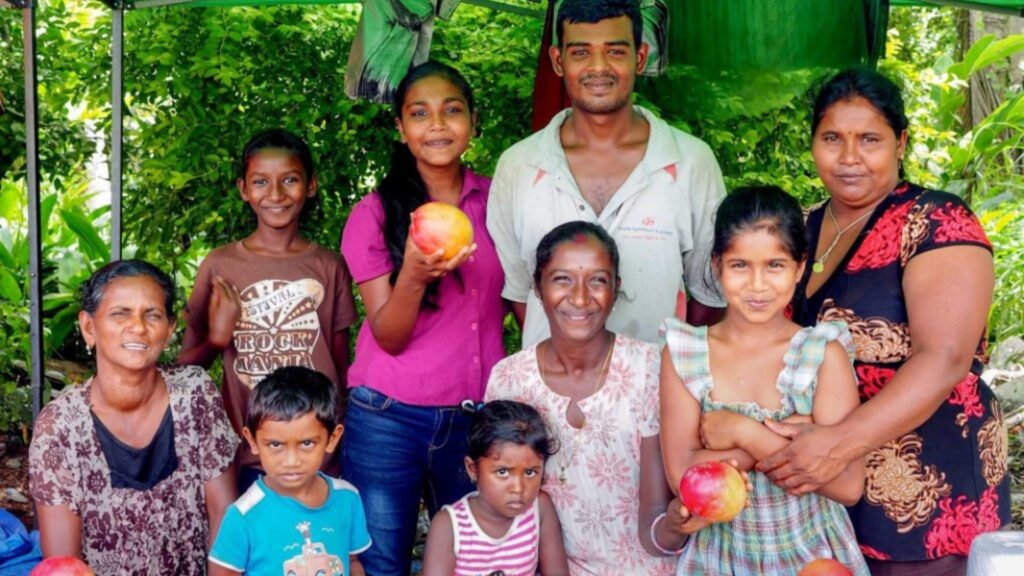
Nearly 40% of Fiji’s population are Indo-Fijian people – descendants of Indian workers who came here during the British colonial era. Today, they’re an essential part of Fiji’s vibrant mix.
You’ll find their influence everywhere: the scent of curry drifting through local markets, Diwali lights glowing across Suva, and Fijian Hindi adding rhythm to daily conversation.
Together, Indo-Fijians and iTaukei make the islands a joyful celebration of diversity and unity.
Fact 4: English Is One of Three Official Languages
If you’re worried about language barriers — relax! English is one of Fiji’s three official languages, along with the Fijian language and Hindi. Most Fijian people speak English fluently, especially in towns and resorts.
You’ll even notice locals mixing all three languages in one cheerful sentence! It’s part of the country’s easygoing charm and multicultural vibe that makes every conversation a little adventure of its own.
Fact 5: ‘Vanua’ is The Beautiful Way of Fijian Life
To understand Fijian life, you need to know one powerful word: vanua. In Fiji, vanua means far more than “land”. It’s a holistic concept that connects the land, the sea, the people, and all living things within a community.
For Fijian people, the vanua is life itself. It provides food, belonging, and identity, while people care for it in return.
The term also describes the people themselves: Lewi ni Vanua — “the people of the land”. It ties families to their ancestors, heritage, and traditions. To live vakavanua — “the way of the land” means living in harmony with nature, community, and custom.
When you visit a Fijian village, you’re not just entering a place — you’re stepping into a living bond between people, spirit, and the world around them.
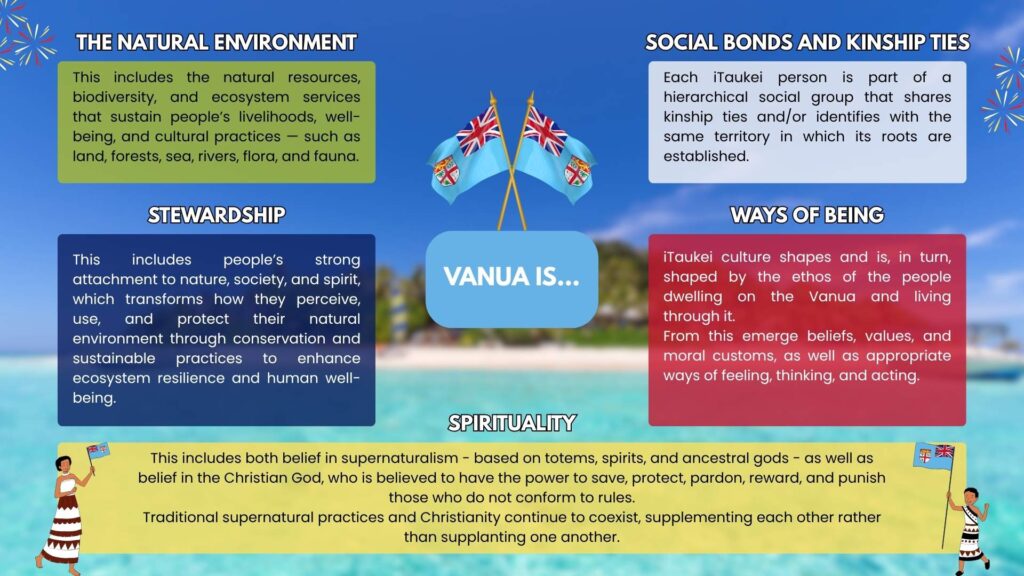
Fact 6: Village Life Still Shapes Fijian Society
Even as cities like Suva and Nadi grow rapidly, village life remains at the heart of Fijian society.
Most iTaukei families maintain strong ties to their home villages, where traditions, ceremonies, and communal work keep everyone connected.
Visitors are often amazed at how welcoming these communities are — it’s not unusual for strangers to be invited in for food, laughter, and a story or two. That’s everyday life for the people of Fiji.
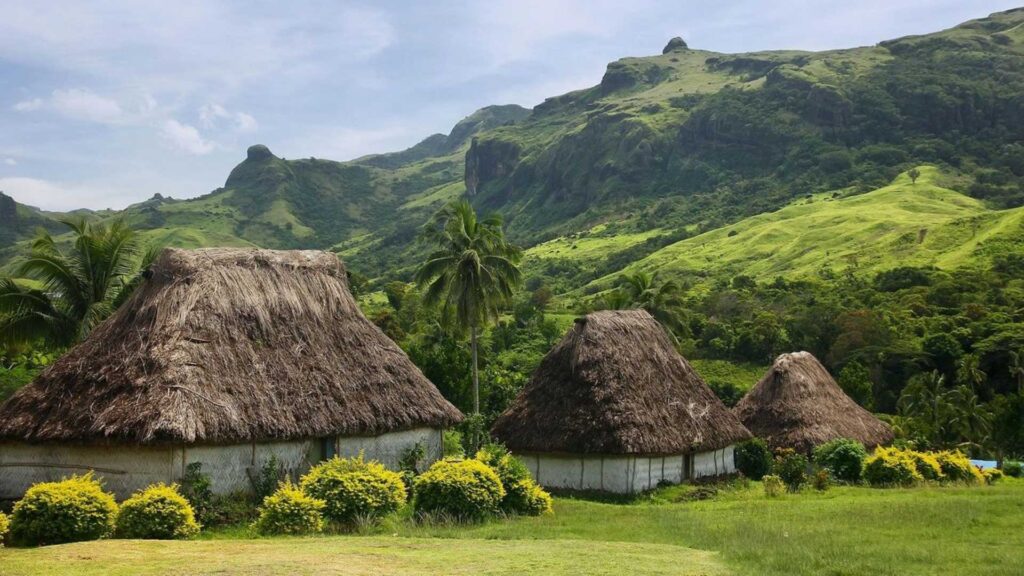
Fact 7: The Kava Ceremony Is Fiji’s Way of Saying “Welcome”
If you’re lucky enough to be invited to a kava ceremony, get ready for one of the most authentic experiences in Fijian culture.
Made from the root of the yaqona plant, kava is shared in a wooden bowl during special gatherings. The ritual starts with a clap, a chant, and a sip — simple but deeply meaningful.
For Fiji islands people, it’s more than just a drink; it’s a gesture of friendship and respect that unites everyone around the bowl.
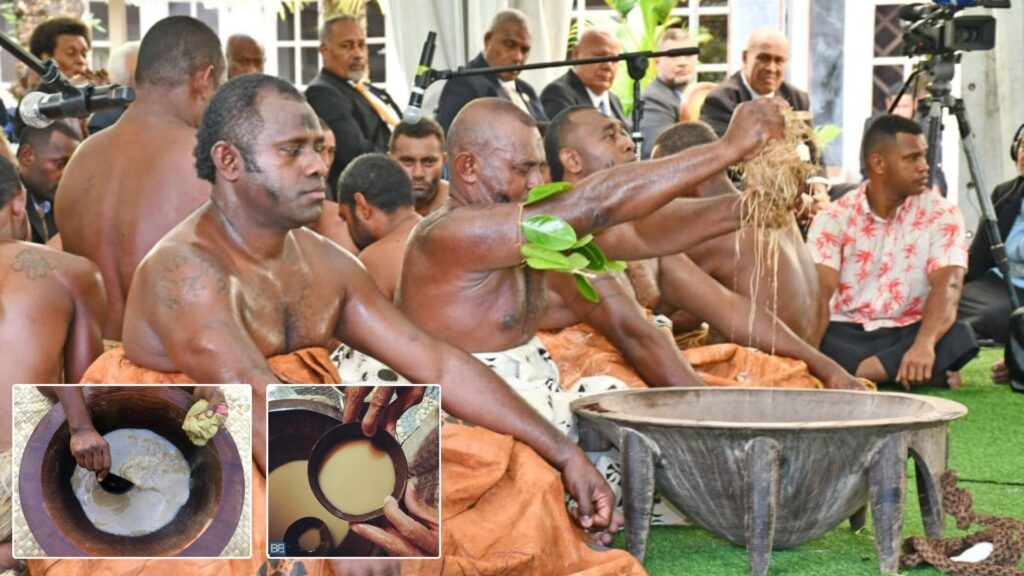
Fact 8: The Tabua (Whale’s Tooth) Holds Sacred Value in Ceremonies
Among the most treasured symbols in Fijian culture is the tabua — a polished whale’s tooth presented during important ceremonies. Once used to seal alliances, weddings, or apologies, it’s still considered one of the most precious gifts a person can give.
When a Fijian offers a tabua, it carries deep emotion and respect — it’s not just a gift, but a promise. This ancient custom beautifully reflects how Fiji people value honor, relationships, and connection.
Fact 9: Fijian Clothing Like the ‘Sulu’ Is Still Worn Today
If you visit Fiji, you’ll quickly spot locals wearing a colorful wraparound skirt called a sulu. It’s worn by both men and women — to work, church, or even formal events. Simple, practical, and stylish, the Sulu is a proud expression of Fijian clothing and their identity.
You can even find sulu vakataga, the tailored version with pockets! Wearing one as a visitor is not only comfortable in the tropical heat — it’s also a fantastic way to show respect for Fijian culture.

Fact 10: Fijian Handicrafts Reflect Their Ancestral Artistry
From woven mats to intricate masi (tapa) cloth made from tree bark, Fijian handicrafts are living pieces of heritage. Each item tells a story — of family, nature, and tradition passed down through generations. You’ll find local markets filled with handmade jewelry, carvings, and baskets, all crafted with love and patience. Buying one isn’t just a souvenir; it’s supporting a community and taking home a little piece of Fiji’s creative soul.
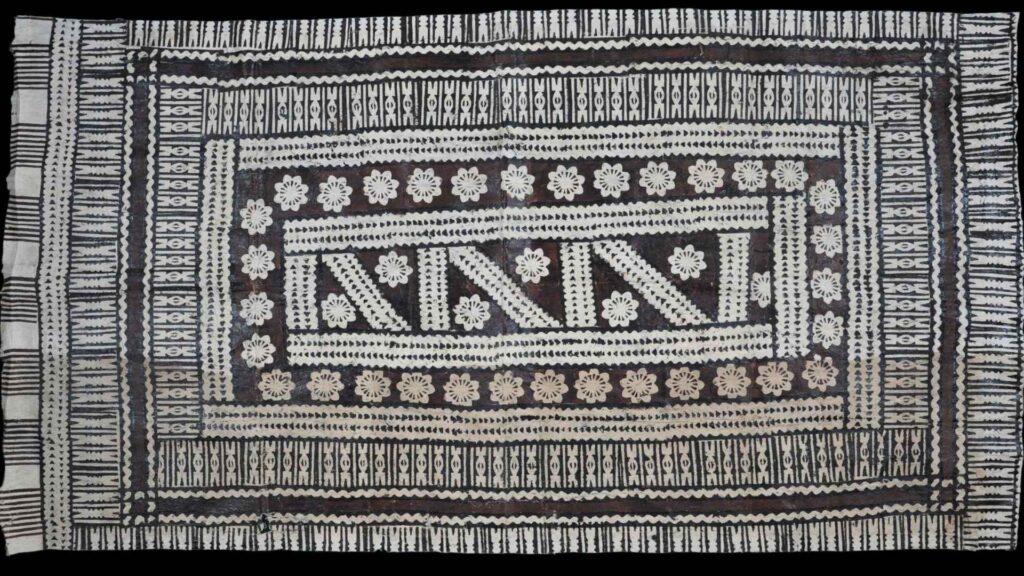
Fact 11: Fijian Cuisine Is a Delicious Blend of Island and Indian Flavors
Fijian food is all about freshness and flavor — think coconut, seafood, and a little spice. You’ll fall in love with kokoda, Fiji’s version of ceviche made with marinated raw fish and coconut cream. Then there’s the Indo-Fijian touch: flavorful curries, roti, and chutneys that fill the air with rich aromas. It’s this mix of island simplicity and Indian zest that makes every meal feel like a celebration of the Fiji people’s diverse roots.
Fact 12: The Traditional ‘Meke’ Dance Brings Stories to Life
Music and movement are the heartbeat of Fijian culture, and nothing shows that better than the meke. This traditional dance blends storytelling, chants, and rhythmic drumming into a mesmerizing performance. Every gesture and beat tells a tale of love, war, the ocean, or daily village life. When you watch the meke, you’re not just seeing a show — you’re witnessing the living spirit of the Fijian people passed down through generations.
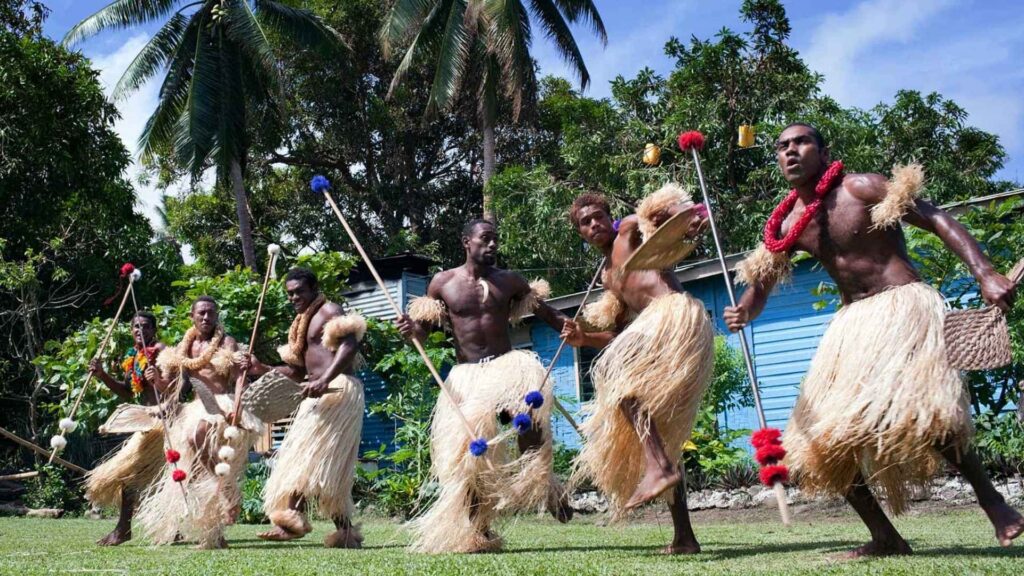
Fact 13: Rugby Is More Than a Sport — It’s a Shared Passion
If there’s one thing that unites everyone in Fiji, it’s rugby. From dusty village fields to packed stadiums, rugby isn’t just a game — it’s part of the people of Fiji island.
The nation’s pride skyrocketed when Fiji won Olympic gold in Rugby Sevens, and you can feel that energy everywhere. Kids play barefoot in the streets, families gather to cheer, and the whole island celebrates every try. Rugby isn’t just a sport in Fiji – it’s a way of life.
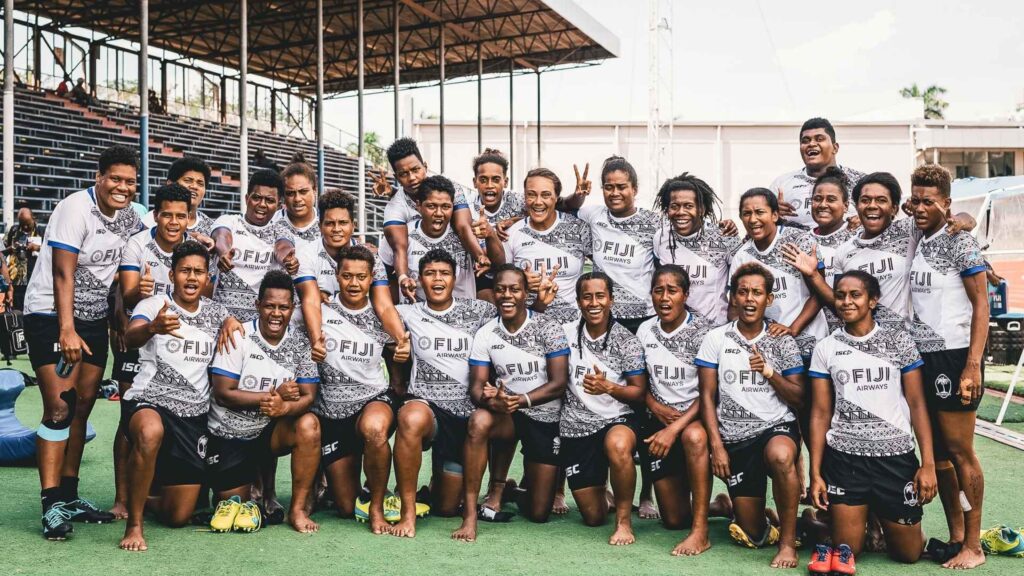
Fact 14: Fijians Are Known for Their Warmth and Generosity
Ask anyone who’s been to Fiji what they remember most – chances are, it’s the people.
The Fiji people are famous for their warmth, laughter, and genuine generosity. Whether it’s a local sharing fruit from their garden or a spontaneous invitation to join a family meal, kindness comes naturally here.
This open-hearted spirit, known as the Bula Spirit, is what makes visitors feel instantly at home. In Fiji, smiles are free and friendship is everywhere.
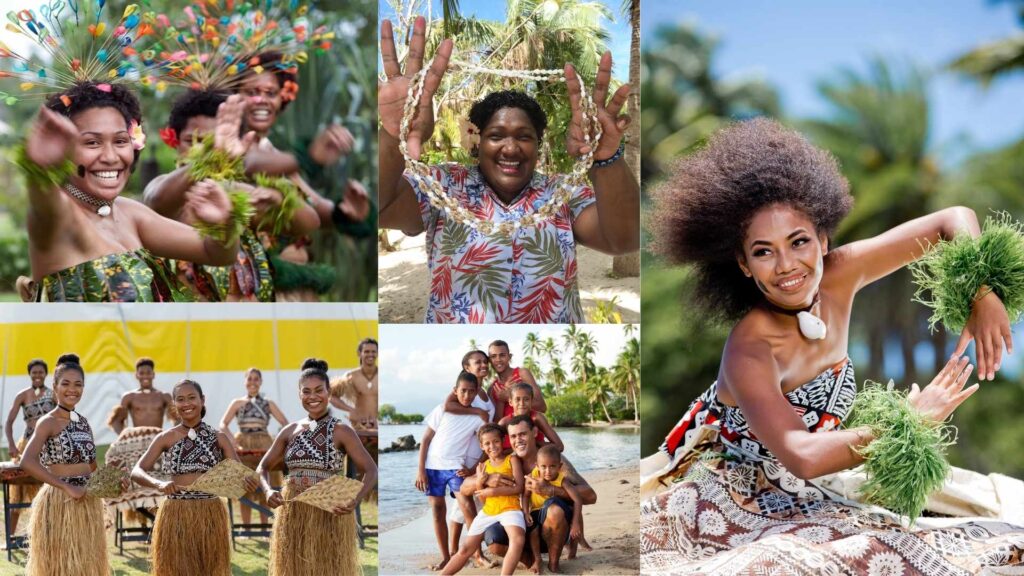
Fact 15: Mangoes Hold a Sweet Spot in Fijian Life
In Fiji, mangoes aren’t just fruit — they’re a sunny symbol of island life. Grown across the country, especially in the fertile Sigatoka Valley, Fijian mangoes are loved for their juicy sweetness and unique tropical flavor. During mango season, roadside stalls overflow with golden fruit, and locals share them like small gifts of sunshine. There’s even an annual Nadi Mango Festival, celebrating community, food, and the simple joy of island living. For the Fiji people, mangoes are more than delicious — they’re a taste of home.
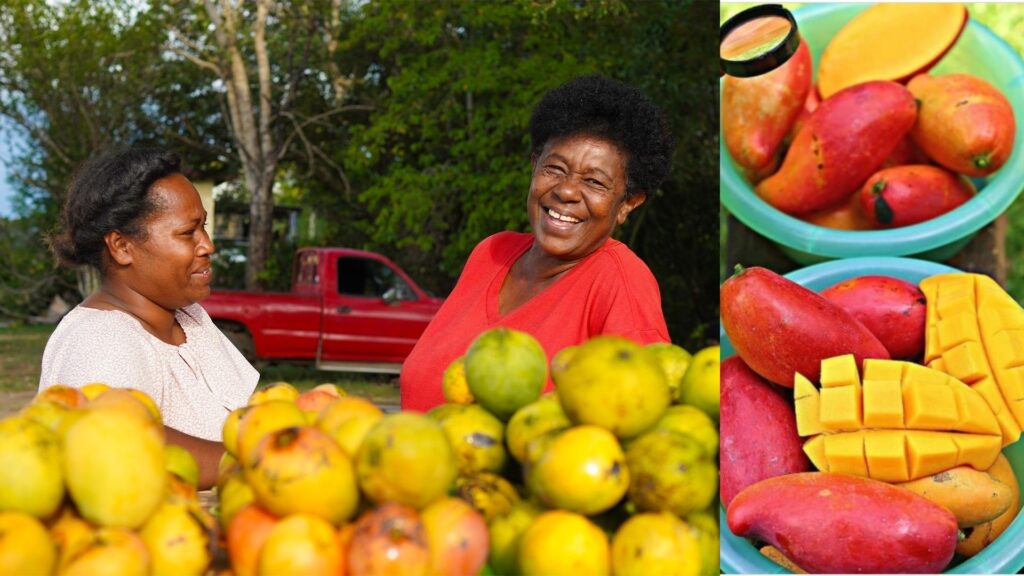
Fact 16: FIJI Water Comes from Fiji, But Isn’t Fijian-Owned
You’ve probably seen the famous square bottle of FIJI Water on store shelves around the world — but here’s something most people don’t know.
The water really does come from Fiji, sourced from an underground aquifer on the island of Viti Levu. However, the brand isn’t locally owned; it’s owned by The Wonderful Company, a U.S.-based corporation.
For many Fiji people, the brand is both a point of pride and a reminder of how their islands are known globally. While FIJI Water’s crystal-clear image promotes the beauty of the islands, the everyday water most locals drink comes straight from nature, no label required.
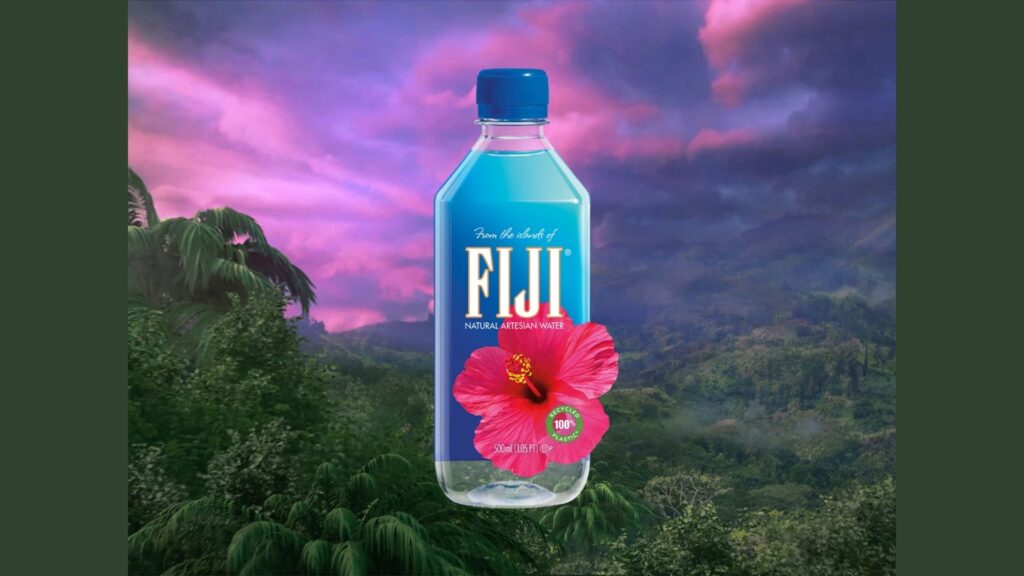
Fact 17: Modern Fijians Balance Tradition With a Global Outlook
While Fijian culture remains deeply traditional, modern Fiji is also buzzing with change.
Young Fijians blend ancient customs with global influences — posting their meke dances on TikTok, studying abroad, then returning home to strengthen their communities.
In cities like Suva and Nadi, you’ll find cafés, art scenes, and tech startups thriving alongside village ceremonies and rugby matches.
The people of Fiji embrace the future, but never forget where they came from — and that’s what keeps their culture alive.
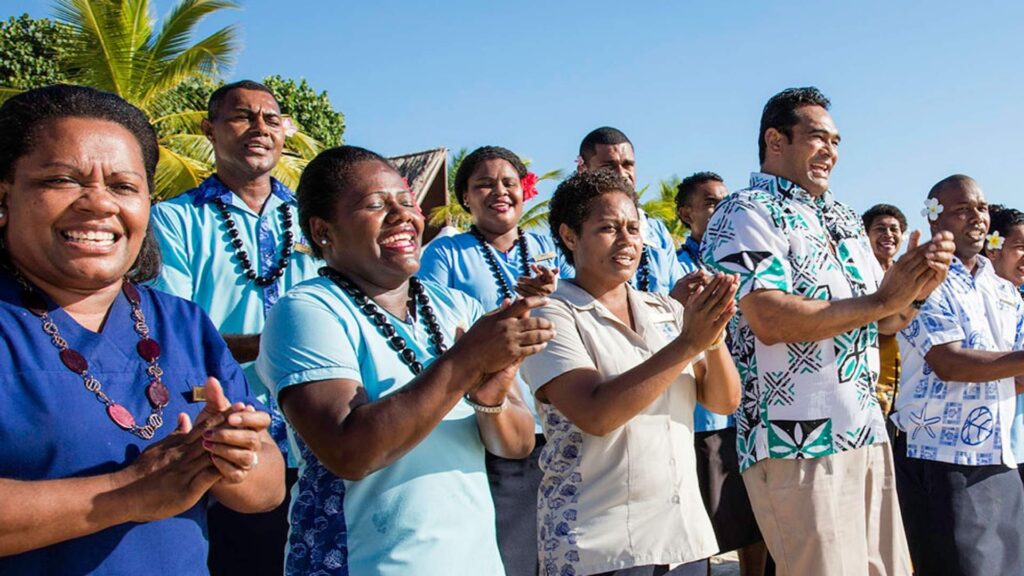
Cultural Tips for Travelers to Fiji
When you visit Fiji, you’re not just exploring paradise but stepping into a living culture built on joy and respect.
Here are a few simple ways to connect meaningfully with the people of Fiji and their beautiful traditions.
1. Always Greet with “Bula!”
“Bula” means hello — and it’s the heart of every interaction in Fiji. Say it with a smile, and you’ll instantly make friends wherever you go.
2. Dress Modestly in Villages
Beachwear is acceptable at resorts, but when visiting villages, wear something modest — a sulu (sarong) is perfect. Locals appreciate visitors who show respect for Fijian customs.
3. Show Respect During the Kava Ceremony
When offered kava, accept it with both hands, clap once before and three times after drinking. It’s a time-honored ritual that symbolizes friendship and unity.
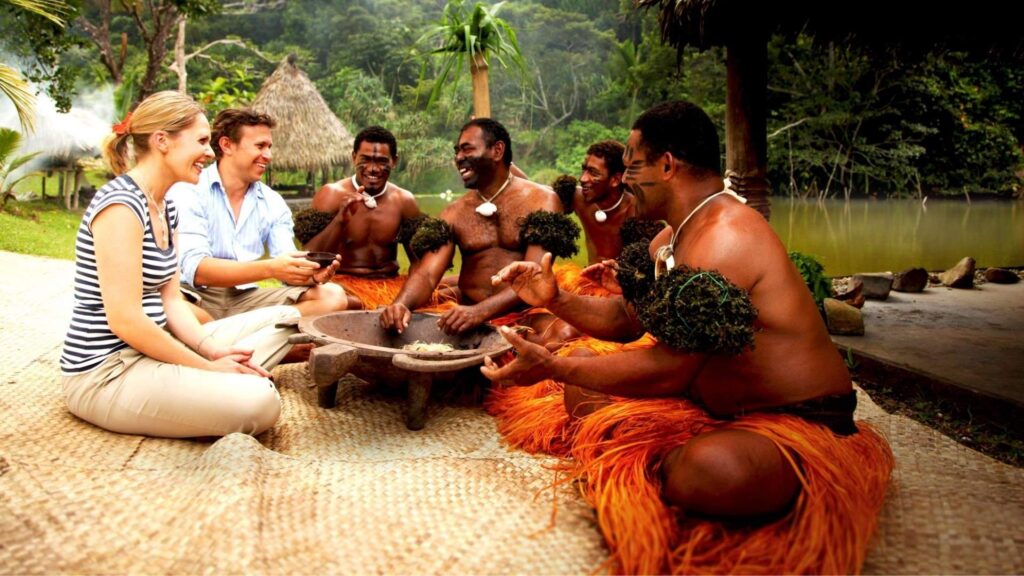
4. Learn a Few Local Words
A simple Vinaka (thank you) or Bula (hello) goes a long way. The Fijian people love it when visitors try to speak their language—it’s a sign of genuine respect.
5. Embrace the Slow Pace
Island time is real – and fantastic. Don’t rush; enjoy conversations, sunsets, and laughter. The best way to experience Fiji is to slow down and live in the moment.
A Smile, A Story, A Spirit – That’s Fiji!
At the end of the day, the magic of Fiji isn’t just in its sunsets or white-sand beaches — it’s in its people. The Fiji people are the heartbeat of these islands, blending ancient traditions with a modern, open-minded spirit. Whether you’re sharing kava under the stars, learning a few Fijian words, or just exchanging smiles with locals, you’ll quickly feel part of something bigger — a culture that celebrates life, laughter, and connection.
So next time you hear “Bula!”, smile back – you’re already part of the family. 🌺
FAQ
What are the Fijian people known for?
Fijian people are best known for their kindness, hospitality, and infectious Bula Spirit. They’re open-hearted, always smiling, and love to share stories, food, and laughter with visitors.
Do Fijian people speak English?
Yes! English is one of Fiji’s three official languages, along with Fijian and Hindi. Most locals speak English fluently, so communication is easy for travelers.
What traditions should I know before visiting Fiji?
The kava ceremony is one of the most important. When you’re invited to join, accept the drink respectfully — it’s a sign of friendship. Also, dress modestly when visiting villages and always greet people with a cheerful “Bula!”.
Are Fijians really that friendly?
Absolutely. The warmth of the Fiji people is genuine — visitors often describe it as one of the most unforgettable parts of their trip. It’s why Fiji is usually called “the friendliest place on Earth.”
What makes Fijian culture unique?
Fijian culture beautifully blends influences from Melanesia, Polynesia, and India. It’s built around community, respect, and joy – expressed through food, dance, ceremonies, and everyday kindness.

I am a cultural historian and editor with over 10 years of research into pre-contact Polynesian history, the Lapita migration, and oral traditions. Share the excitement of my latest publications.
My contact:
Email: [email protected]
Tel: +64 21 456 7890

